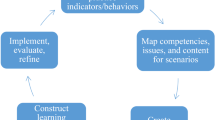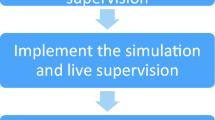Abstract
This article reviews procedures for using simulated families in the training of novice-level family therapists. An evaluation of one training experience is described. The evaluation utilized a repeated measures analysis and found an increase in the student's observational and conceptual skill development.
Similar content being viewed by others
References
Bardill, D. R. The simulated family as an aid to learning family group treatment.Child Welfare, 1976,55, 703–709.
Berg B. Learning family therapy through simulation.Psychotherapy: Theory, Research, and Practice, 1978,15, 56–60.
Breunlin, D.C., Falicov, C. J., Lattimer, A. D., & Desai, V. J.A family interview. Chicago, Illinois: Center for Educational Development, University of Illinois School of Medicine, 1982.
Breunlin, D. C., & Schwartz, R. C.A family therapy assessment exercise. Chicago, Illinois: Center for Educational Development, University of Illinois School of Medicine, in press.
Breunlin, D. C., Schwartz, R. C., Krause, M. S., & Selby, L. M.: Evaluating family therapy training: The development of an instrument.Journal of Marital and Family Therapy, 19839, 37–47.
Byng-Hall, J. The use of the earphone in supervision. In R. Whiffen & J. Byng-Hall (Eds.),Family therapy supervision: Recent developments in practice, pp. 47–56. New York: Grune & Stratton, 1982.
Cleghorn, J. M., & Levin, S. Training family therapists by setting learning objectives.American Journal of Orthopsychiatry, 1973,43, 439–446.
Falicov, C. J., Constantine, J. A. & Breunlin, D. C. Teaching family therapy: A program based on training objectives.Journal of Marital and Family Therapy, 1981,7, 497–505.
Haley, J..Problem solving therapy: New strategies for effective family therapy. San Francisco, California: Jossey-Bass Publishers, 1976.
Jessee, E., & L'Abate, L. Enrichment role-playing as a step in the training of family therapists.Journal of Marital and Family Therapy, 1981,7, 507–514.
Kniskern, D. P., & Gurman, A. S. Research on training in marriage and family therapy: Status, issues and directions.Journal of Marital and Family Therapy, 1979,5, 83–94.
Liddle, H. A. Family therapy training: Current issues, future trends.International Journal of Family Therapy, 1982,4, 81–97.
Minuchin, S.Families and family therapy. Cambridge, Massachusetts: Harvard University Press, 1974.
Minuchin, S., & Fishman, H. C.Family therapy techniques. Cambridge, Massachusetts: Harvard University Press, 1981.
Montalvo, B. Aspects of live supervision.Family Process, 1973,12, 343–359.
Myers, J. L.Fundamentals of experimental design. Boston, Massachusetts: Allyn and Bacon, Inc., 1979.
Pegg, P. F., & Manocchio, A. J. In on the act. In R. Whiffen & J. Byng-Hall (Eds.),Family therapy supervision: Recent developments in practice, pp. 57–67. New York: Grune & Stratton, 1982.
Raasoch, J., & Laqueur, H. P. Learning multiple family therapy through simulated workshops.Family Process, 1979,18, 95–98.
Tomm, K. M., & Wright, L. M. Training in family therapy: Perceptual, conceptual and executive skills.Family Process, 1979,18, 227–250.
Weingarten, K. Family awareness for nonclinicians: Participation in a simulated family as a teaching technique.Family Process, 1979,18, 143–150.
Author information
Authors and Affiliations
Additional information
The authors would like to express appreciation to Douglas C. Breunlin, M.S.S.A. for helpful comments in the preparation of this article.
Rights and permissions
About this article
Cite this article
West, J.D., Hosie, T.W. & Zarski, J.J. Simulation in training family therapists: Process and outcome. International Journal of Family Therapy 7, 50–58 (1985). https://doi.org/10.1007/BF00924022
Issue Date:
DOI: https://doi.org/10.1007/BF00924022




